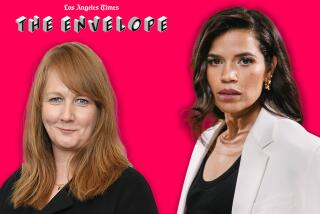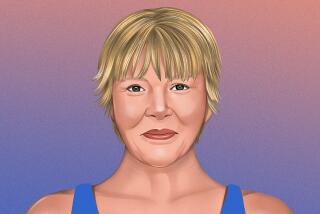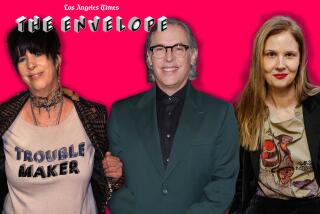Jessica Chastain and Saoirse Ronan speak their minds — along with other top actresses
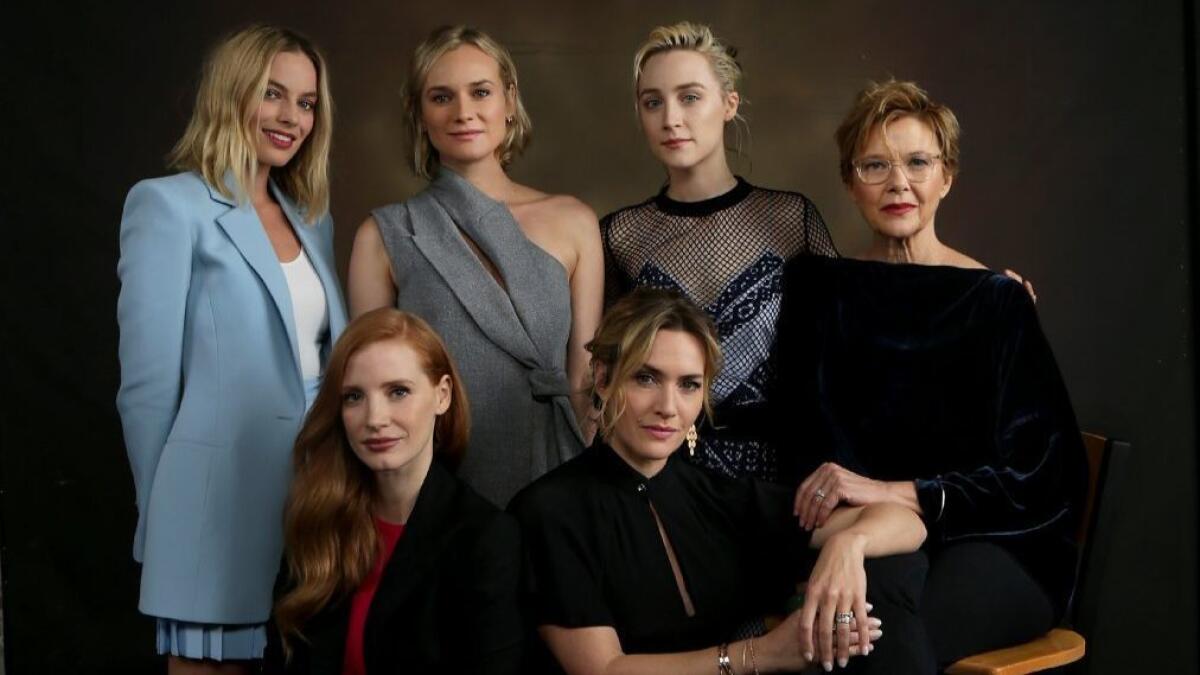
Awards season always get us thinking about what it must be like to work in the movies, so we invited six leading actresses to join The Envelope to share their insights. Answering our call was Annette Bening, who plays former Hollywood leading lady Gloria Grahame romantically linked to a much younger man in her final years in “Film Stars Don’t Die in Liverpool”; Jessica Chastain, who plays real-life poker entrepreneur Molly Bloom targeted by the FBI in “Molly’s Game”; Diane Kruger, who won the Cannes film festival’s top acting prize for her portrayal of a woman whose husband and child have been killed by terrorists in “In the Fade”; Margot Robbie, who stars as disgraced figure skater Tonya Harding in the quirky “I, Tonya”; Saoirse Ronan, as a Sacramento teen looking for her place in the world in “Lady Bird”; and Kate Winslet, who stars in Woody Allen’s 1950s Coney Island drama “Wonder Wheel.”
With ages ranging from 23 to 59, the women talked with Times film writers Mark Olsen and Amy Kaufman about looking good vs. feeling good, the treatment of women on screen, learning from film roles and finding confidence. Oh, and how the Kardashians helped in prepping for a role.
Here’s an excerpt of the conversation, edited for length and clarity.
Amy Kaufman: Jessica, at Cannes you made a remark after being a part of the jury there about some of the things you had seen reflected in the films. Can you talk about what you saw?

Actress Jessica Chastain found the portrayal of women in the films she saw at the Cannes film festival “really disturbing.”
Chastain: Yeah, I had never seen 21 films in such a short amount of time, one after the other. And one of the things that I wouldn’t have noticed on its own, but when watching in that concentration became very clear to me was how the world viewed women. And how little stories talked from a woman’s point of view, from a female protagonist, a story about a woman who wasn’t victimized.
Mark Olsen: Annette, you play the actress Gloria Graham and part of what the movie is about is the way that Hollywood treats actresses. Was that one of the things you were interested in portraying?
Annette Benning: I didn’t have a lot of real detail about what actually happened to Gloria. But what’s fascinating is you watch women in that period and especially in her case, she was often playing the bad girl, was how often she got slapped, hit and beat up in the movies. And at that point it wasn’t even a comment. That was just an accepted thing that happened. I think there’s a theme, I was at the Venice Film Festival on the jury this year also watching films from all over the world and the number of movies that had to do with emotional, sexual and physical violence towards women — and if the story wasn’t about that, then it was tangentially part of the mix of the narrative.
Kaufman: Jessica, you’ve always been very vocal on social media. Do you feel like, and this is for all of you, do you feel the freedom to be open about your opinions, about the industry?
Chastain: I’m open with my opinions because I’ve only been in the industry for six years. I started pretty late — 2011 is when my first film came out. I’d already had the great fortune of growing up out of the industry. I don’t know how to not speak out. And also working on “Zero Dark Thirty” with Kathryn Bigelow and that whole experience kind of lit the match in me.
Saoirse Ronan: It depends on the work that you’re doing and the people that you’re working with. Everyone here does good work and we do work that sort of has a certainly gravity to it. And I think when you surround yourself with the right kind of work you feel like you’re encouraged to share your opinions and your thoughts on things.
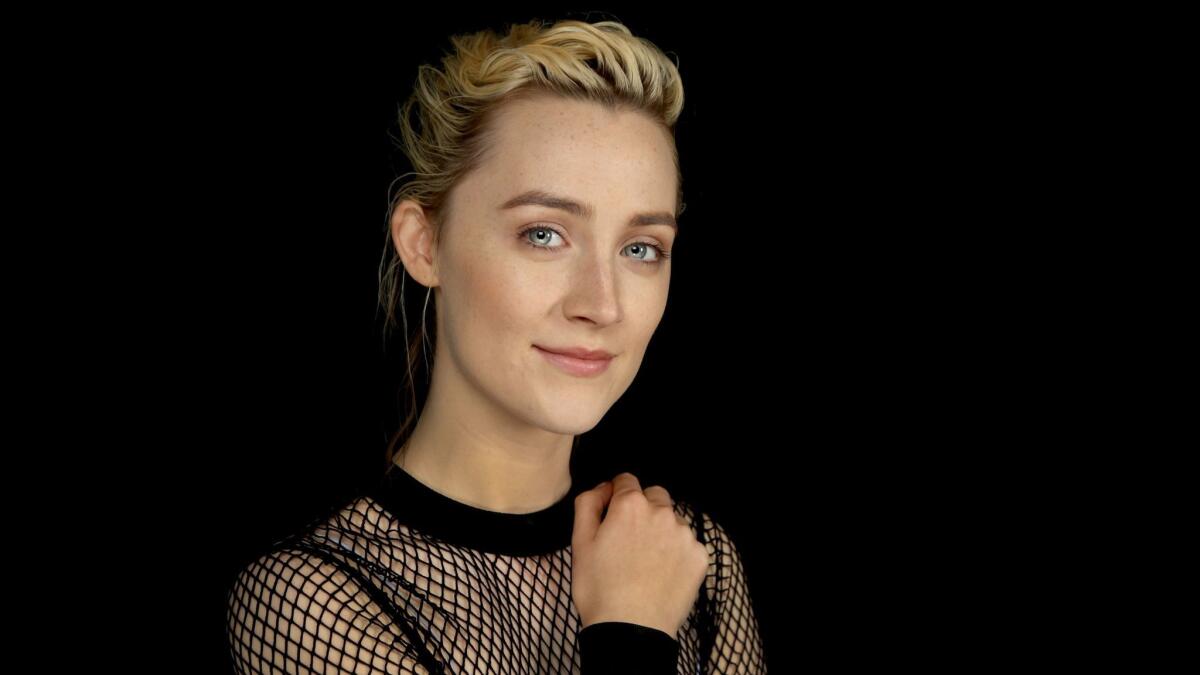
WATCH: Envelope Roundtable Q&A’s from this season’s hottest contenders »
Olsen: Kate, “Wonder Wheel” is so unusual; it feels very theatrical and sort of outsized in a way. How was that on set?
Kate Winslet: Well, I mean Woody Allen is an extraordinary writer. And he’s obviously known for having created extraordinary roles, very powerful complicated roles for women for many years. And to join that lineage of incredible actresses made me feel terrified. It’s set in Coney Island. Its where he’s from. So I think his effervescence and his enthusiasm really was quite infectious for everyone. Vittorio Storaro was our cinematographer. And because my character, Ginny, lives above a shooting alley within an amusement arcade, there were the fairground lights always coming through the windows. Constantly through every scene the colors would be shifting and changing. It was quite mesmerizing to be a part of something like that. You can be midway through a 14-page piece of dialogue and it’s all being done in one continuous shot. And the lights probably changed about seven times. It gives that sense of heat and that feeling of freneticism. It was really exhilarating to be a part of something like this.
Kaufman: Your movie is so intrinsic to New York. And Diane, you were born in Germany, but “In the Fade” is your first German-language film, right?
Diane Kruger: I was waiting for a part to come out of Germany for a long time, but I left 25 years ago and I don’t really know anyone in the German film industry. And my director, Fatih Akin, is actually Turkish, born in Germany but of Turkish descent. And I grew up with his films. I met him five years ago in Cannes. I was a jury member. And went up to him and said, “Please if you ever want to make a film with me, I would love to.” And so he remembered. Actually, he had this project for a while, but it was always a male protagonist. And upon meeting me he changed it to a woman.
Margot Robbie: Yes!
Kruger: So the movie talks about a terrorist attack. It’s based on a true story. It’s a group of neo-Nazis, this couple in Germany that place a bomb [in a Turkish neighborhood], and my 6-year-old child and my husband die. And the movie is really a movie about grief. It’s about one woman’s journey, how can you go on living after losing everything? And seeking justice for what happened. It feels very real.
Kaufman: You did a lot of research, I know, to look into that. And so did you, Margot, for your role playing ice skater Tonya Harding. That story is so well known here but you grew up in Australia, so you weren’t as familiar with it?
Robbie: I didn’t know who any of these people were going into it so I could really approach it with no preconceived notions, but I quickly found out that everyone has passed judgment on her. And the way they remembered it after all these years, would be like, “Oh yeah, Tonya, she hit her opponent with a bat.” And I’m like, no she didn’t. She actually didn’t. Over the years, she’s kind of transformed into a punch line and a villain. There’s an amazing amount of footage and documentaries made about her. It was amazing to be able to see what she was like at 15. And then obviously through her 20s when her skating career was at its peak she did a ton of interviews. And then the incident happened and she was even more widely publicized. We didn’t set out to be like she’s a victim, poor her or she’s a hero. It was just, she’s a person.
Kaufman: There’s so many ideas about her out there in the same way that there were about Molly Bloom who you play, the poker princess. What did you come in to it feeling about her?
Chastain: I had the opposite experience and it actually made me mad at myself. One thing we’re looking at right now is how the media judges women and blames women. When I started googling Molly Bloom, I saw these pictures of her walking out of the courthouse and thought, “OK, I think I understand who this woman is. I think perhaps this woman is using her experience to try to have 15 minutes of Look at Me.” And then I met her and realized that I had been suckered into this image that the media had presented me of her. I mean Molly Bloom was someone and twice in our film — which I’m so grateful to Aaron Sorkin for writing — twice in our film, the men around her tell her she’s not presenting herself appropriately.
The film very much deals with patriarchy and patriarchal society. Her boss tells her ugly shoes, ugly dress. And then she buys something that she says makes her look completely separate from herself and she presents this sexually desirable version that is the more palatable to the men in the game. And then in the government her lawyer says, “You look like the Cinemax version of yourself. You need to change your clothes.” So, so many times in the film the men are telling Molly what she needs to be in order to be taken seriously.

“Molly’s Game” actress Jessica Chastain explains how researching for her role gave her “a lot of compassion for women in our society” for everything they have to go through just for “someone to listen to what they have to say.”
Kaufman: What was your experience like wearing those really tight bandage dresses? And a lot of makeup, not your vibe?
Chastain: I had pictures of the Kardashians all over my trailer because for me it was so much about what society tells women they need to be to be valuable. So I would show up on set with this long black hair, my spray tan and my short dresses with the highest heels and my cleavage out. And I could feel immediately like now people are paying attention to me. And at the same time I felt smaller because I couldn’t do things, like I couldn’t lean over and sit in a way that was comfortable. So I experienced this energy shift in the room, but I also experienced the personal energy shift that made me kind of feel like, “Oh I have to somehow protect myself because I can’t walk normal. My skirt’s going to go too high up. I have to be a certain way.”
Winslet: I recently have been looking at a book, it’s called “Strong Is the New Pretty.” And it’s a book of images of young girls being athletic, being active, being strong, being proud talking about their hobbies, talking about what they aspire to be in their lives. And it just made me think, God, I hope that we’re able to give that over to the younger generation. And that we’re putting across an image of what it means to be strong, successful, proud of your body, proud of who you are, proud of the things that you say. You know, taking some ownership so that a younger generation and the one underneath that will know that those are interesting things to aspire to be. And that it isn’t about an image.
Ronan: It’s more so about who we are as a person compared to our body shape or anything like that. Everyone’s got a responsibility, too.
Chastain: I like what you said, it’s who were are as a person. Because if someone wants to wear a bandage dress, more power to her, right.
Ronan: One thing that I’m sure you guys get all the time, they’re constantly telling me to smile. And to be honest when I go onto a red carpet it’s a weird situation to be in. And the last thing I want to do is go, “This is great, isn’t it?”
Kaufman: Speaking of feeling comfortable, you seemed so yourself in “Lady Bird.” Just a teenager.
Ronan: The physicality of Lady Bird was very important to get right and it took some time for us to figure out exactly. I think we basically spent the whole shoot trying to figure out who this girl was because we’re finding her at this sort of in-between moment in her life where she doesn’t know who she is. And so she’s on that sort of journey to figure out where she’s going and what she wants to say and where she wants to end up and things like that. The great thing about playing someone like her is that she is actually like a showman. And so in one scene she could be, you know, the comedian. In the next scene she’s crazy insecure. And the next scene she’s the best friend. And so it was great as an actor to just sort of try on all these different characters from one moment to the next.
Robbie: When I was trying to play Tonya at 15, I was really trying to remember what I felt like at 15. And the thing that I remember most is I was so painfully self-conscious of everything.
Ronan: But that’s the thing, young kids need to know from all of us that it’s all right to not feel really confident all the time. It’s all right to not always feel your best because we feel that, too. Actors definitely go through it; we’re so vulnerable.
Winslet: It takes years to acquire confidence — whatever your chosen vocation is. To have the confidence to be who you are.
Bening: When you’re a creative person, whatever your field — writing or painting or singing, acting — there’s always a certain amount of insecurity or uncertainty or there’s a search going on and, in a way, that never really stops. What you were describing when you were working with Woody, that’s always there. You want to be in a place of uncertainty, a place that maybe something surprising could happen.
Winslet: Acting is being scared, being vulnerable, being raw.
Ronan: And tapping into that.
Olsen: Diane, for you it seems like your role is something that would be very far away from your own experience, what did you tap into for that?
Kruger: Yeah, I don’t have children so playing a mother who’s losing her child was definitely far away from what I could imagine. For me it was meeting with a lot of victims. You know I sat in a lot of self-help groups. I met about 30 families who had lost kids or family members. Not necessarily to terrorism but to murder. And I think what you’re saying I think when you grow older I didn’t quite realize how sometimes, maybe to my own fault, but sometimes a character makes you discover so much more about yourself and your capability of empathy.
And while you as an actor search for truth of that character especially when it’s a contemporary film and something happens, you know, it’s still ongoing like it is in my film. The reality of meeting people that go through something so real and the different stages of grief and living in this world that we all live in with terrorism and attacks happening and people sometimes being reduced to numbers. A hundred people died, 50 people died. We don’t ever stop and think about the people that stay behind six months later a year later, two years later. And I will never forget the reality that these people live.
Olsen: Do you all find that some part of your roles carry on with you?
Chastain: I give myself over to my characters. I mean “Tree of Life,” what an incredible character to play because it’s basically a meditation on grace and love and I would expand my heart space in the morning before I would get on set. And then “Zero Dark Thirty,” all of a sudden I’m playing a character [whom] her superiors don’t value and won’t listen to her. So she has to make herself be heard. So then I walked away from that film thinking if that happens to me in my real life it’s not so scary if I need to speak up for myself.
Olsen: And do you have some sense yet of what you’re carrying on from Molly Bloom?
Chastain: I think that I feel more for women now. I used to judge whenever I would hear that there was a sex tape out there or when I would hear that they were a nude model or whatever, which I do nudity in my films so, it’s nothing of that. I would believe what the media would feed me.
Kaufman: The judgment on looks is so intense. Margot, I remember when you got announced for “I, Tonya,” honestly there were a lot of headlines that said Margot’s too beautiful to play Tonya Harding, which is unfair to both of you.
Robbie: I thought when I signed on to produce and play Tonya that everyone would be like, “How dare she, she’s not American.” It was all about the looks.
Kaufman: You produced this movie. And I know Jessica you have a production company. Have you been trying to take more creative control as your careers evolve?
Winslet: It’s so important that we do start to carve out not just our own destiny but to create a platform and provide a world in which we can create more great strong roles for women. And tell stories driven by women. You know I read somewhere the other day that Linda Hamilton is back as the 68-year-old action heroine [of “Terminator”]. And I just went about … time. The men they can keep on going into their 70s playing the action heroes. Unless we do start to carve out a little bit of that ourselves, I genuinely don’t think that anyone else is going to do it for us. Annette and I were just saying earlier we have a daughter the exact same age both interested in acting. Let’s give them something to look forward to being a part of that isn’t just about looks, let’s have them aspire to be a 68-year-old action heroine.
More to Read
From the Oscars to the Emmys.
Get the Envelope newsletter for exclusive awards season coverage, behind-the-scenes stories from the Envelope podcast and columnist Glenn Whipp’s must-read analysis.
You may occasionally receive promotional content from the Los Angeles Times.
